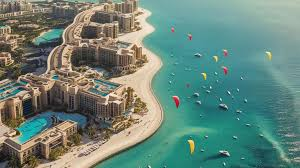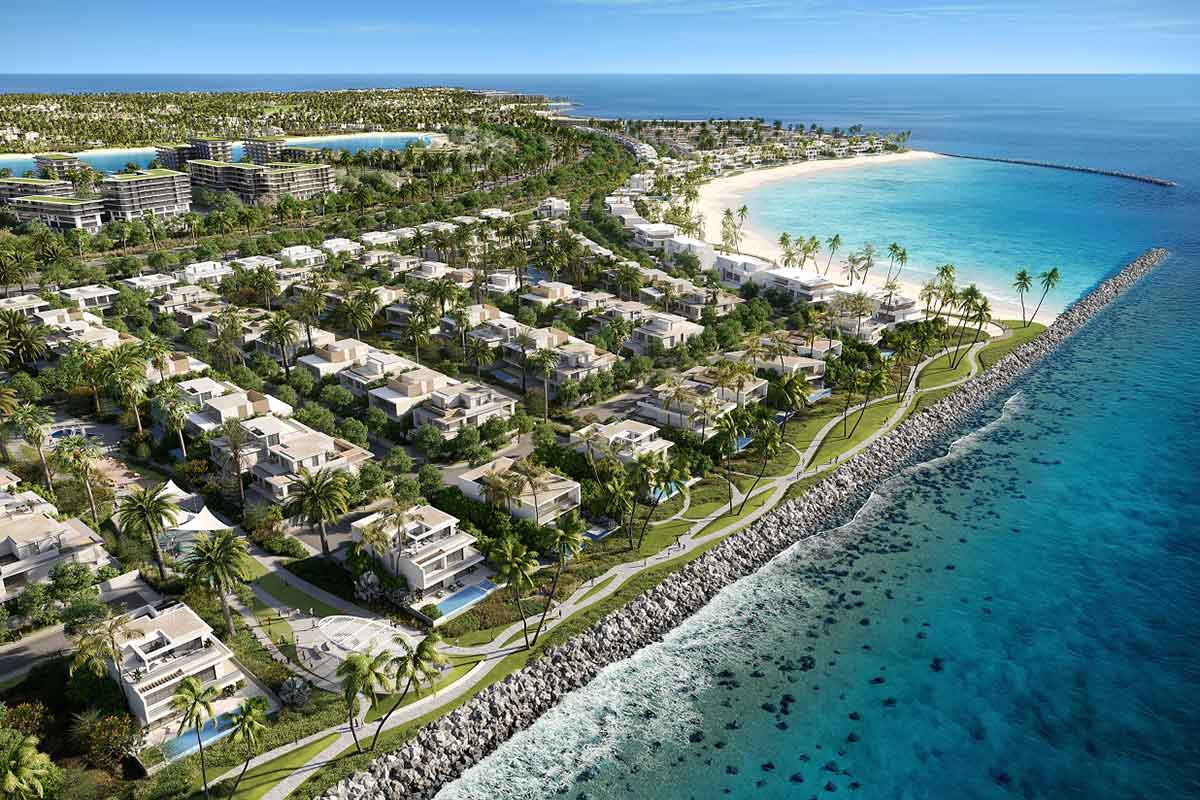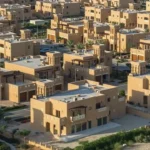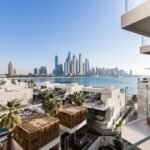Now Reading: Buying Property in Dubai as a Foreigner: Full Tax Breakdown 2025
-
01
Buying Property in Dubai as a Foreigner: Full Tax Breakdown 2025
Buying Property in Dubai as a Foreigner: Full Tax Breakdown 2025

Table of Contents
Imagine stepping into your new Dubai apartment, the skyline sparkling outside, knowing you’ve navigated the tax landscape like a pro to secure a smart investment. Buying Property in Dubai as a Foreigner For foreigners in 2025, Dubai’s real estate market is a magnet, offering 100% freehold ownership, a dirham pegged to the U.S. dollar for stability, and no personal income tax, capital gains tax, or annual property taxes for individuals.
With 58% of buyers hailing from countries like the UK, India, and Russia, Dubai saw 94,000 property transactions in the first half of 2025. Delivering 4-8% rental yields and 8-12% price appreciation, it outshines London (2-4%) or New York (3-4%). Properties over $545,000 qualify for a 10-year Golden Visa, while smaller units offer 2-year residency perks.
Residential purchases dodge 5% VAT, but transfer fees, developer fees, and corporate taxes for some buyers can add up. This guide breaks down the full tax picture for foreigners buying in prime areas like Downtown Dubai, Dubai Marina, and Palm Jumeirah, focusing on projects like Burj Al Arab Views, Marina Gate, and Palm Jumeirah Ocean Villas.
Dubai’s Tax-Friendly Allure for Foreigners
Located 15-30 minutes from Dubai International Airport via Sheikh Zayed Road, areas like Downtown Dubai, Dubai Marina, and Palm Jumeirah boast vibrant communities, 50-80 kilometers of coastline, and low 2-3% vacancy rates compared to 7-10% globally, driven by 25 million tourists and a 5% population surge. Foreigners keep 100% of rental income ($48,000-$240,000 annually on a $1.2 million-$4 million property), versus $26,400-$144,000 elsewhere after taxes.
Zero capital gains tax saves $60,000-$280,000 on a $300,000-$1 million profit, and no annual property taxes save $12,000-$80,000 yearly, unlike New York (1-2%) or London (council tax up to 2%). Residential purchases avoid 5% VAT ($60,000-$200,000), and individuals dodge the 9% corporate tax. Free zone companies save $1,000-$30,000 annually, and small business relief waives corporate tax for revenues under $816,000 until December 31, 2026. These benefits make Dubai a haven, but hidden costs require careful planning.
The tax-light vibe feels like a warm welcome to your new home.
No Personal Income Tax: Keep Your Rental Income
Foreigners enjoy no personal income tax, a massive win compared to the U.S. (up to 37%) or UK (up to 45%). A $2 million Marina Gate apartment yielding $80,000-$120,000 annually keeps every dirham, versus $44,000-$72,000 elsewhere, saving $36,000-$48,000. A $4 million Palm Jumeirah villa yielding $160,000-$240,000 saves $72,000-$96,000.
Long-term leases require Ejari registration ($54-$136 annually), while short-term rentals, boosted by 25 million tourists, need DTCM registration ($408-$816). Short-term rentals increase yields by 10-20%, adding $8,000-$48,000, especially in tourist-heavy Dubai Marina. This tax-free income is a major draw, but registration costs must be budgeted.
Tax-free rentals feel like a monthly boost to your financial dreams.
Zero Capital Gains Tax: Maximize Sale Profits
Dubai’s zero capital gains tax lets foreigners keep 100% of sale profits. Selling a $2 million Burj Al Arab Views apartment for $2.5 million after 25% appreciation yields a $500,000 tax-free profit, saving $100,000-$140,000 compared to London (20-28%) or New York (20-37%). A $4 million Palm Jumeirah villa sold for $5 million yields a $1 million tax-free gain, saving $200,000-$280,000. With 8-12% price growth Downtown at 8-10%, Marina at 5-7%, and Palm Jumeirah at 10-12% this benefit drives demand, but transfer fees on resale must be considered.
Keeping every dirham feels like a financial victory.
No Annual Property Taxes: Lower Ownership Costs
Unlike global markets where annual property taxes cost $12,000-$80,000 on a $1.2 million-$4 million property, Dubai imposes none, a huge relief for foreigners. Maintenance fees ($5,000-$25,000) and a 5% municipality fee on rentals ($2,400-$12,000) are the main ongoing costs, far lower than New York’s 1-2% or London’s council tax. Downtown Dubai’s high-rise density keeps maintenance at $5,000-$10,000, while Palm Jumeirah’s villas hit $15,000-$25,000. Dubai Marina averages $5,000-$15,000. These low costs enhance affordability, but foreigners often overlook these fees when budgeting.
No property taxes feel like a weight lifted from your investment.
VAT Exemption: Save Big on Purchases
Residential purchases are VAT-exempt, saving $60,000-$200,000 on a $1.2 million-$4 million property, unlike commercial properties or the UK’s stamp duty (up to 12%, or $144,000-$480,000). Off-plan purchases, common in Downtown and Palm Jumeirah, may incur 5% VAT on developer fees ($20,000-$80,000), recoverable via Federal Tax Authority (FTA) registration ($500-$1,000).
Short-term rental operators must register for VAT if revenue exceeds $102,041, charging 5% but claiming credits on expenses like DTCM fees ($408-$816). A $2 million Marina Gate apartment yielding $80,000-$120,000 incurs $4,000-$6,000 in VAT but allows $1,000-$3,000 in credits. A $4 million Palm Jumeirah villa yielding $160,000-$240,000 incurs $8,000-$12,000 but allows $2,000-$5,000 in credits. Non-compliance risks fines up to $13,612, so foreigners must stay vigilant.
The VAT exemption feels like a warm handshake for buyers.
Transfer Fees: The Main Upfront Cost
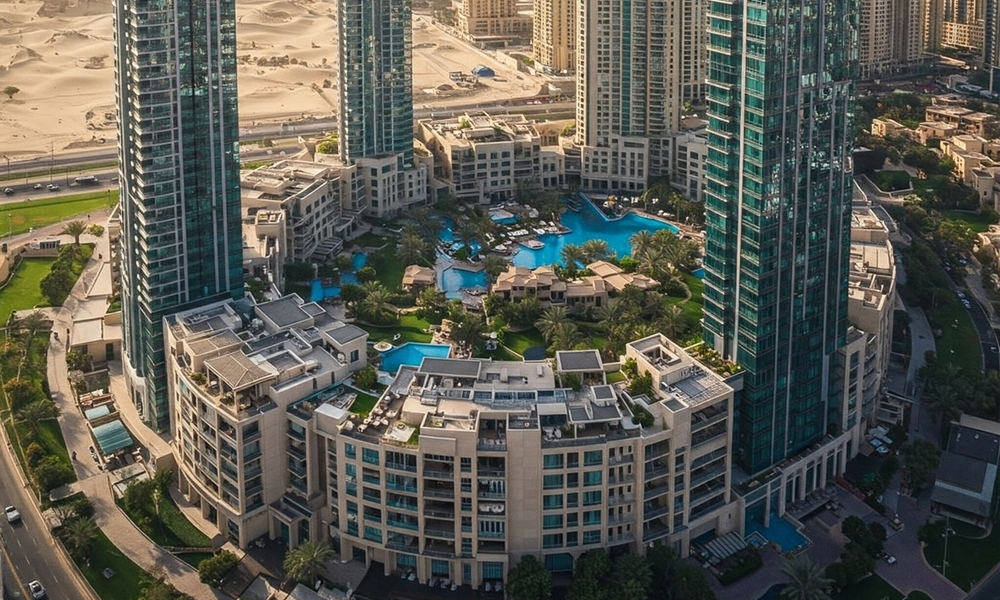
Foreigners face transfer fees, primarily the 4% Dubai Land Department (DLD) fee, split between buyer and seller unless negotiated. For a $2 million Burj Al Arab Views apartment, this is $80,000; for a $4 million Palm Jumeirah villa, it’s $160,000. Broker fees, typically 2% ($40,000-$80,000), cover agent services. Title deed issuance ($136-$272) and developer fees for off-plan properties (up to $2,722) add up.
Mortgage registration (0.25% of the loan, or $5,000 for a $2 million loan) and valuation fees ($680-$1,360) apply for financed deals. Gift transfers to family or shareholders reduce DLD to 0.125% ($2,500-$5,000), saving $77,500-$155,000. These costs are modest compared to London’s stamp duty but can surprise unprepared foreigners.
Transfer fees feel like a manageable step toward luxury ownership.
Corporate Tax: A Trap for Business Buyers
The 9% corporate tax, introduced in 2023, applies to businesses unless exempt, impacting foreigners buying through companies. A company leasing a $2 million property yielding $80,000-$120,000 faces a 9% tax ($7,200-$10,800), reducing net income to $72,800-$109,200. Qualified Free Zone Person (QFZP) status in areas like Dubai Multi Commodities Centre (DMCC) avoids this, saving $12,240-$30,600, with setup costs of $2,000-$5,000. Small business relief waives corporate tax for revenues under $816,000 until December 31, 2026. Individual ownership avoids this tax, making it ideal for most foreigners.
Corporate taxes feel like a sneaky snag for business-minded buyers.
New Tax Rule 1: Domestic Minimum Top-up Tax (DMTT)
Effective January 1, 2025, the DMTT imposes a 15% tax on multinational enterprises (MNEs) with global revenues over €750 million ($793 million). A corporate entity leasing 10 properties with $1 million in income faces a 15% tax ($150,000), reducing net income to $850,000. Individual foreigners and smaller entities with revenues below $816,000 are unaffected, and QFZP status avoids DMTT, saving $12,240-$61,200 on $122,400-$612,000 in income. This rule targets large corporations, preserving Dubai’s tax-light appeal for most foreign investors.
The DMTT feels like a corporate tweak, sparing individual wealth.
New Tax Rule 2: Qualifying Investment Fund (QIF) Updates
Cabinet Decision No. 34 of 2025, effective Q2 2025, refines QIF and Real Estate Investment Trust (REIT) rules. QIFs remain exempt from corporate tax if real estate income is below 10% of total income and ownership is diversified. If a QIF earns $1 million, with $200,000 from real estate, 80% ($160,000) faces 9% tax ($14,400). Restructuring costs $1,500-$4,000. Individual foreigners avoid these rules, enjoying tax-free gains, while corporate buyers must ensure compliance to minimize taxes.
QIF updates feel like a smart challenge for corporate portfolios.
Burj Al Arab Views: Downtown’s Tax-Smart Gem
Burj Al Arab Views by Emaar in Downtown Dubai, set for completion in Q3 2025, offers 1-3 bedroom apartments ($1.2 million-$2 million) with 5-7% rental yields and 8-10% price growth. A $2 million apartment yields $80,000-$120,000 tax-free, saving $36,000-$48,000. Selling for $2.5 million yields a $500,000 tax-free profit, saving $100,000-$140,000. No property taxes save $20,000-$40,000 yearly, and VAT exemption saves $100,000. Transfer costs include a 4% DLD fee ($80,000), 2% broker fee ($40,000), and title deed issuance ($136-$272). Gift transfers save $77,500. Maintenance fees are $5,000-$10,000, with a 5% municipality fee ($4,000-$6,000). QFZP saves $20,400-$30,600. U.S. investors deduct depreciation ($36,364-$72,727), saving up to $24,545. Golden Visa eligibility applies.
The skyline views feel like a tax-smart dream come true.
Marina Gate: Vibrant Tax Efficiency
Marina Gate by Select Group in Dubai Marina offers 1-3 bedroom apartments ($1.2 million-$2 million) with 7-8% rental yields and 5-7% price growth. A $2 million apartment yields $80,000-$120,000 tax-free, saving $36,000-$48,000. Selling for $2.5 million yields a $500,000 tax-free profit, saving $100,000-$140,000. No property taxes save $20,000-$40,000 yearly, and VAT exemption saves $100,000. Transfer costs include a 4% DLD fee ($80,000), 2% broker fee ($40,000), and title deed issuance ($136-$272). Gift transfers save $77,500. Maintenance fees are $5,000-$10,000, with a 5% municipality fee ($4,000-$6,000). QFZP saves $20,400-$30,600. U.S. investors deduct depreciation ($36,364-$72,727), saving up to $24,545. Golden Visa eligibility applies.
The marina buzz feels like a tax-efficient haven.
Palm Jumeirah Ocean Villas: Luxury Tax Haven
Palm Jumeirah Ocean Villas by Nakheel, set for completion in Q2 2025, offer 4-6 bedroom villas ($3 million-$6 million) with 4-6% rental yields and 10-12% price growth. A $4 million villa yields $160,000-$240,000 tax-free, saving $72,000-$96,000. Selling for $5 million yields a $1 million tax-free profit, saving $200,000-$280,000. No property taxes save $40,000-$80,000 yearly, and VAT exemption saves $200,000. Transfer costs include a 4% DLD fee ($160,000), 2% broker fee ($80,000), and title deed issuance ($136-$272). Gift transfers save $155,000. Maintenance fees are $15,000-$25,000, with a 5% municipality fee ($8,000-$12,000). QFZP saves $40,800-$61,200. U.S. investors deduct depreciation ($72,727-$109,091), saving up to $36,364. Golden Visa eligibility applies.
The beachfront elegance feels like a tax-free paradise.
Strategies to Minimize Tax Costs
For foreigners: First, hold properties personally to avoid corporate taxes. Second, negotiate DLD fee splits, saving $40,000-$80,000 on a $2 million-$4 million property. Third, use gift transfers to reduce DLD to 0.125%, saving $77,500-$155,000. Fourth, recover 5% VAT on developer fees via FTA registration ($500-$1,000). Fifth, use double taxation treaties with 130+ countries to avoid foreign taxes. Sixth, U.S. investors deduct depreciation ($36,364-$109,091) and management fees ($2,400-$14,545), saving up to $36,364. For corporates: First, obtain QFZP status to avoid 9% tax and DMTT. Second, keep QIF income below 10%. Third, leverage small business relief until 2026. Hire a property manager ($5,000-$25,000 annually) and tax professionals to avoid fines up to $136,125.
These strategies feel like a shield against unexpected costs.
Ongoing Costs Beyond Taxes
Post-purchase, maintenance fees ($5,000-$25,000) and a 5% municipality fee on rentals ($2,400-$12,000) apply. No annual property taxes save $12,000-$80,000 yearly. Short-term rentals boost yields by 10-20%, adding $8,000-$48,000, but require DTCM registration ($408-$816). Mortgage interest deductions for U.S. investors save up to $36,364. These costs, lower than London’s council tax ($24,000-$80,000), are often underestimated by foreigners.
Ongoing costs feel like a gentle breeze compared to global markets.
Navigating Risks in 2025
A projected oversupply of 41,000 units may slow price growth, with Palm Jumeirah less affected due to its prestige. Mitigate by choosing trusted developers like Emaar or Nakheel, verifying escrow compliance under the 2025 Oqood system, and targeting low-vacancy projects (2-3%). Ensure QFZP and VAT compliance to avoid fines. Short-term rentals leverage 25 million tourists, while long-term leases ensure stability. Proximity to key hubs drives value.
Why Dubai Is a Foreigner’s Tax Haven
Burj Al Arab Views, Marina Gate, and Palm Jumeirah Ocean Villas offer no personal income tax, capital gains tax, or property taxes, saving $12,000-$280,000 annually. With 4-8% yields, 5-12% price growth, and Golden Visa perks, these 2025 projects make Dubai a vibrant, tax-smart haven for foreigners, provided they plan for transfer and VAT costs.
read more: How Real Estate Taxation Differs Across Dubai’s Island Developments



